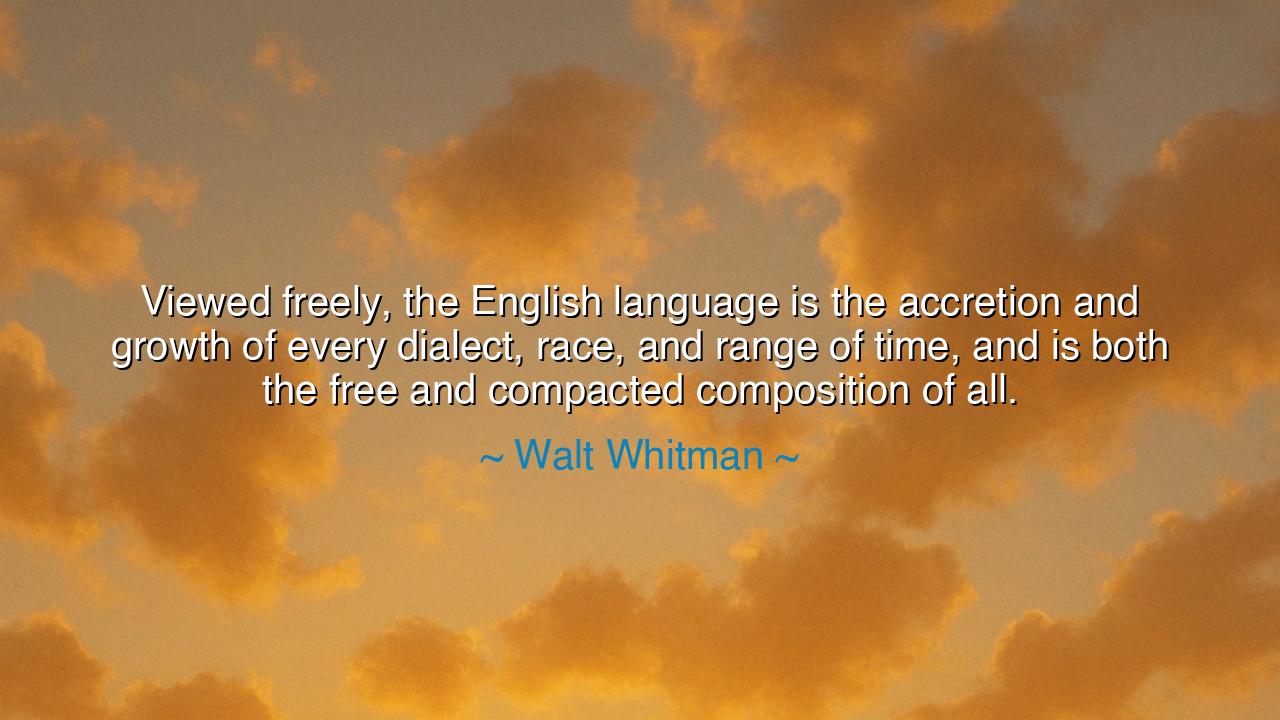
Viewed freely, the English language is the accretion and growth
Viewed freely, the English language is the accretion and growth of every dialect, race, and range of time, and is both the free and compacted composition of all.






Hear the voice of Walt Whitman, bard of democracy and celebrant of the human soul: “Viewed freely, the English language is the accretion and growth of every dialect, race, and range of time, and is both the free and compacted composition of all.” These words carry the weight of centuries, reminding us that language is not the invention of one people, nor the guarded treasure of a single age. It is a living river, swelling with the streams of countless tongues, peoples, and histories.
The ancients knew that words are more than sounds—they are vessels of culture, memory, and identity. Whitman, in his vast vision, saw the English language not as a pure and fixed form, but as a grand mosaic, an ever-growing edifice shaped by conquest, migration, trade, and imagination. From the whispers of Anglo-Saxon fields to the cadence of Norman courts, from the Latin of monks to the voyages that brought in words of distant shores, English became not one voice, but a chorus of many.
Consider the tale of the Norman Conquest in 1066. When William’s armies triumphed, they brought with them a new tongue, rich with French and Latin influence. For centuries, the ruling classes spoke one language, and the common people another. Yet over time, these voices mingled, clashed, and wove together, until English emerged transformed—richer, broader, carrying in its breast the traces of both conqueror and conquered. Thus Whitman’s words find their proof: the growth of English is the growth of every dialect and every people who touched it.
So too in later centuries, as English sailed upon ships to the Americas, to Africa, to Asia, it did not remain unyielding. It absorbed new words, new rhythms, new metaphors. From the indigenous tongues of the New World to the cadences of African speech carried through tragedy and resilience, English grew not by closing itself, but by opening wide. It became, as Whitman declared, “the free and compacted composition of all.” It is a tapestry of sorrow and triumph, of meeting and mingling, of endless transformation.
But hear this warning: to deny the many roots of the English language is to deny its true strength. Some would claim it as the possession of one people, one race, one tradition. Yet Whitman reminds us that its power comes precisely from its inclusiveness, its accretion of all. To forget this is to shrink the vastness of English into a narrow box, stripping it of the richness born from the mingling of countless lives and histories.
The lesson is clear: cherish language as a living monument of human unity. When you speak or write in English, remember that you carry within your words echoes of Norse sailors, Celtic poets, Norman lords, African storytellers, Indian philosophers, and countless others. It is a heritage not of purity, but of blending. It is proof that human culture grows not in isolation, but in contact, exchange, and communion.
Practical wisdom lies before you: honor the diversity of voices within English. Read widely, from the classics of old to the voices of the present day. Listen to the accents and dialects that color speech, for each carries history within it. Write and speak with awareness that your words are built upon centuries of mingling. And above all, resist the impulse to treat language as the property of one group alone—recognize it as the shared inheritance of all who contribute to its song.
Therefore, let Whitman’s words be remembered: “The English language is the growth of every dialect, race, and range of time.” In them lies a truth greater than grammar: language is humanity itself, ever evolving, ever expanding. To honor it is to honor the mingling of peoples, the weaving of history, the shared song of the world.






AAdministratorAdministrator
Welcome, honored guests. Please leave a comment, we will respond soon